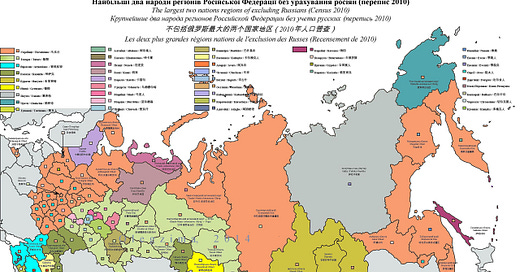Kamil on Nukes and Civil War in Russia
"Foreign policymakers are unwilling to have serious discussions with anyone except for basically the most liberal opposition, who just want to keep the empire intact."
Kamil Galeev is an open-source researcher, Twitter luminary, and my former grad-school classmate in Beijing. He recently joined me on ChinaTalk to discuss the current situation in the war in Ukraine and what it means for:
Prospects of nuclear war;
Elite Russian politics and Putin's future viability;
State stability;
Moscow's grip on the regions.
ChinaTalk is a reader-supported publication. To receive new posts and support our work, consider becoming a free or paid subscriber.
Putin’s Nuclear Considerations
Jordan Schneider: The prospect of nuclear escalation: what are your general thoughts? Does this idea of losing to the US versus losing to Ukraine apply at all as you think about how Putin is considering nuclear weapons?
Kamil Galeev: I think this could be rational from Putin's perspective. That doesn't mean he will necessarily make a nuclear strike, but that makes it possible in order to trigger a direct American reaction. It could be rational domestic policy-wise because you would transform the unmanageable risk of losing to Ukraine to the manageable risk of losing to the US.
Another factor to consider when we are discussing Russia’s great-power status [is that] we are always referring to its nuclear power, especially when now we’ve seen Russian conventional army is not as great as we thought before. But I think that too many journalists, analysts, [and] even politicians see it as unproblematic. They regard Russia’s nuclear status as some imminent-feature reality: grass is green, sky is blue, Russia is a nuclear power.
But the thing is, in the 1990s the Soviet machine tool industry died. Not only did production die, entire associated technological chains — numerical control production, metal-cutting instruments production, bearings production, spindles production, cross production — died. What didn't die in the 1990s died in the 2000s.
Why? Because by the end of the 1990s, those few Russian producers who could afford to buy new industrial equipment switched to imports. By the late 1990s, even before Putin came to power, Russian factories started outsourcing their production of industrial equipment. Theoretically, Putin could have done something with it when he came to power, but he pumped lots of oil revenue into the military buildup. There was no program of reviving machine tools building production. As a result, military plants spent all this money they got from Putin on buying equipment from developed countries, not from China.
The first attempts to change the situation came in the 2010s largely as a result of the Georgian War, when the Russian government first got concerned about too strong an interdependency, but the effect was very moderate. You could not rebuild and revise the entire technological chain. Even if Russia has some domestic productions now, it is mostly screwdriver assembly. The interdependency on industrial equipment is basically 100%. The continuation of Russia’s nuclear status depends on the goodwill of the West. The nuclear arsenal, nuclear delivery systems arsenal, and land arm arsenal cannot be even maintained, let alone expanded, without the continuous import of hardware and software from developed countries.
Putin cannot nuke you until you supply him with all the necessary equipment and software to maintain his nuclear arsenal.
Russian Imperialism and the War
Jordan Schneider: Kamil, you’ve got five minutes with Biden. What do you tell him?
Kamil Galeev: I would tell him that the problem with the current US strategy is not so much some technical decisions regarding involvement in this war as much as the lack of a broader vision.
Imagine a military defeat is inflicted upon Russia, which is absolutely possible by this point. What next? Much of the establishment just does not see an alternative to the current regime. The majority still presumes that Putin and his clique will hold power in Moscow. Others wish for some group of so-called liberal politicians taking power and basically regrouping the Russian system again.
I think that the solution to the current situation is not de-escalation or regime change, as many propose. It should be decolonization of Russia.
Russia is not so much a nation-state as it is basically the last European colonial empire that wasn't decolonized. Imagine if the Portuguese Empire just stayed intact and Brazil was still ruled from Lisbon. That's very close to how the Russian Empire is governed in reality. I think if the decolonization and dismantlement of the Russian Empire could be pulled into the focus now, it would be a very good thing. In order to do this, it would be necessary to talk with regional actors, interest groups, and activists. I find it very problematic — and you see it a lot of times — that foreign policymakers are unwilling to have serious discussions with anyone except for basically the most liberal opposition, who just want to keep the empire intact. It would be advantageous if they could at least listen to other perspectives that I'm afraid they're currently ignoring.
I’m a Tatar. I don't consider myself Russian. I find it very problematic that my people, and other peoples, served as taxpayers and cannon fodder for Russian imperial wars for centuries.

Civil War Risks and Elite Interests
Jordan Schneider: Kamil, who else do you want to talk to? Navalny? Igor Sechin?


